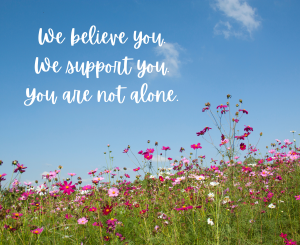I’m a survivor of sexual abuse, and I’m also a mom.
Although I know my experience is far from unique, it’s also something that’s rarely spoken about.
Sometimes there are conversations in the support groups I’m a part of about how being a survivor affects our parenting in general, but one issue that remains widely untouched is what it’s like to go through pregnancy and give birth as a survivor.
The truth is, I haven’t talked about it either.
Why? Because it’s excruciating for me to think about and extremely hard to process. Having conflicting feelings of intense trauma coming back into consciousness but also an overwhelming sense of love and gratitude within the same experience is, well, complicated.
So let’s talk about it. Let’s rip the metaphorical Band-Aid right off.
While writing this article, I’ve had many hard conversations with people I love about the elements of their birthing experiences they found to be triggering, challenging, and retraumatizing. To some, my list may seem unprecise, anecdotal, and quantitative. Please know that while it is the result of more than a few midnight heart to hearts, it is written by “just another mom.”
Let’s talk about flashbacks. Nearly everyone I’ve spoken to has described some kind of flashback during their prenatal care, during labor and delivery, or afterward while caring for an infant. A flashback is when you relive some part of the trauma you experienced, and having a baby gets incredibly “up close and personal.” Between prenatal exams, internal ultrasounds, and the entire process of giving birth itself, there is a LOT of room for intense flashbacks.
Let’s talk about disassociation. Feeling disassociated can often feel like you’re disconnected or detached from your thoughts, memories, and actions. Survivors often use disassociation as a method of coping during situations that induce fear, pain, or helplessness. Feeling disassociated can disrupt labor, make bonding with your baby difficult, and increase the risk of postpartum depression and anxiety.
Let’s talk about body memories. Body memories are just that — memories that your body holds even if your consciousness doesn’t. This one is tricky because it’s very hard to control, and you may not even know you have body memories before you experience them. Obviously, during pregnancy, labor and delivery, and postpartum there could be countless body memory triggers.
Let’s talk about anxiety and panic attacks. Not feeling completely in control of our (as survivors) bodies can be paralyzing. Body autonomy is essential. For every wonderful doctor, midwife, and nurse out there, there seem to be three more who perform their procedures with minimal warning or communication. It can feel very retraumatizing.
Let’s talk about feeling the need to explain yourself. The constant necessity to repeat why you feel “extra sensitive” or desire your practitioner to “communicate more than normal” takes a toll. It’s truly exhausting. This one especially applies if you feel uncomfortable breastfeeding, because the push in hospitals to repeatedly attempt breastfeeding can feel very intense.

To all my fellow survivor mamas out there, I’m giving you a little extra encouragement this month. I’m sorry you’ve had to be so strong, and I’m sorry if you’ve felt pressured to be silent. You are not alone — too many of us are right there with you.
If you are have been abused or assaulted and you want to reach out for help, you can contact the Boston Area Rape Crisis Center HERE and talk to a counselor.














